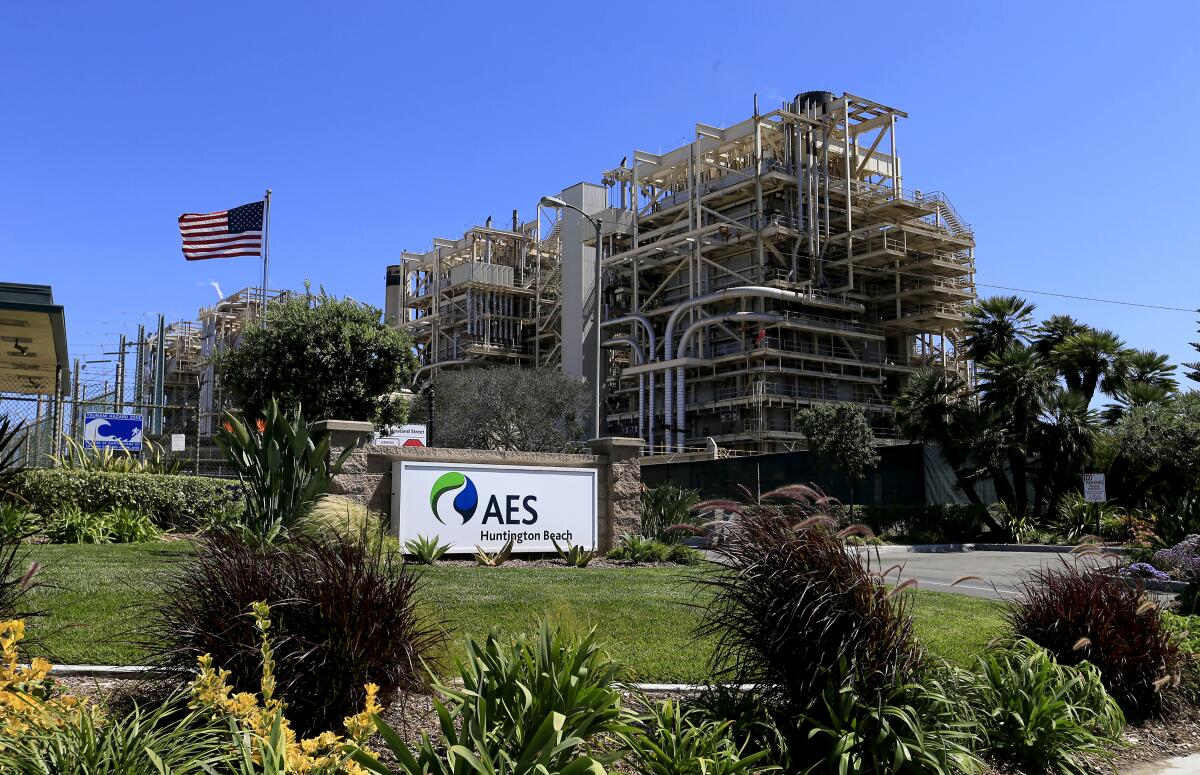Controversial Poseidon desalination plant in Huntington Beach set for hearings this week

- Share via
Poseidon Water’s seawater desalination plant in Huntington Beach, first proposed in 1998, could be getting closer to beginning construction after more than two decades.
The Santa Ana Regional Water Board will hold online hearings this week and decide whether to issue Poseidon a permit. The hearings begin at 9 a.m. Thursday and are scheduled to continue Friday, as well as Aug. 7 if needed, with a vote scheduled at the end of the hearings. The hearings can be viewed at cal-span.org.
Should the regional board approve the plant, Poseidon would also need a permit from the California Coastal Commission before it could purchase water from the Orange County Water District and begin construction.
Poseidon’s controversial proposal for its Huntington Beach plant, which would be located adjacent to the AES power station on Newland Street, includes producing 50 million gallons per day of desalinated water. That’s more than 18 billion gallons a year, enough to serve about 400,000 Orange County residents. The company is billing the $1.4-billion project as the largest local, drought-proof water supply in Orange County, and a recent study by Oakland-based M.Cubed found the project would support more than 3,000 jobs during the construction phase and 282 jobs annually during the operation phase.
“We applied for this amendment and renewal of the permit in 2016, so it’s been four long years to get back to the point where the board can authorize this permit,” Poseidon Vice President Scott Maloni said. “The [Santa Ana Regional Water Board] staff is recommending approval, so I’m confident that the staff has done their work and that the permit they’re recommending to their board is both scientifically sound and legally defensible.”
Poseidon’s operating permit was originally granted in 2006, but the state has implemented new regulations for desalination plants since then. Maloni said that Poseidon originally planned to use the wastewater that the AES plant was using, not draw water from the ocean, before the state forced power plants to decommission their seawater cooling systems.
Maloni said Poseidon has made amendments to its plans in recent years, including reducing the volume of seawater used and instituting a screen that has one-millimeter slot widths to limit marine animal loss, as well as installing a brine diffuser.
Several prominent local environmental groups oppose the plant. Ray Hiemstra, the executive director of programs of Costa Mesa-based Orange County Coastkeeper, said he is not opposed to desalination in general but also not convinced that Huntington Beach needs the Poseidon plant.
“In Orange County, we have a lot of local water,” Hiemstra said. “Especially in north Orange County, where the Poseidon plant is being proposed. It’s really about, do we need to kill the marine life, do we need to pollute the ocean right there, and do we need to pay that much money, all for water we don’t need? Nobody’s really been able to show a real need. They say they would like to have it. The analogy I use is, ‘Hey, I’d like to have a Ferrari too, but I have no idea how I’d pay for it and I have no idea where I’d put it if I had one.‘”
A UCLA study published last year concluded that the Poseidon plant would make drinking water for financially disadvantaged households in Orange County moderately to severely less affordable.
“We have so many more solutions that can be implemented right away that will create good, clean jobs, like conservation and rainwater capture,” said Andrea Leon-Grossman, deputy director of Latino community organization Azul. “They are a lot more sustainable and a lot easier on the pocketbook of families, especially now with the public health crisis and the economic downturn.”
However, a telephone survey conducted in May by Newport Beach-based J. Wallin Opinion Research found that 76% of likely voters at least somewhat supported the Poseidon plant.
Under the permit drafted by the regional water board, Poseidon would also be responsible for the upkeep and restoration of the Bolsa Chica Ecological Reserve wetlands.
The fire was contained by 7 p.m. Sunday, Huntington Beach Fire Department spokesman Eric Blaska said, and no injuries or structural damage were reported.
“It’s not just a water supply project now, it’s an environmental enhancement project as well,” Maloni said.
Former Huntington Beach Mayor Shirley Dettloff, who is a board member of the Amigos de Bolsa Chica nonprofit, said the group supports the mitigation work being done at Bolsa Chica. Poseidon would restore an additional 15 acres of wetlands, she said, and also fund keeping the Bolsa Chica ocean inlet open.
“Without that title inlet being open, we will destroy the wetlands, and of course I’ve worked most of my adult life to save Bolsa Chica,” Dettloff said. “That ocean inlet is very, very important, and having 15 acres restored is a great asset to the natural resource itself and certainly to the community.”
The Bolsa Chica Land Trust stance is that it opposes the plant “due to the significant environmental damage that the plant will inflict to our precious coastal environment.” The Land Trust is remaining neutral during discussion of proposed mitigation.
All the latest on Orange County from Orange County.
Get our free TimesOC newsletter.
You may occasionally receive promotional content from the Daily Pilot.





